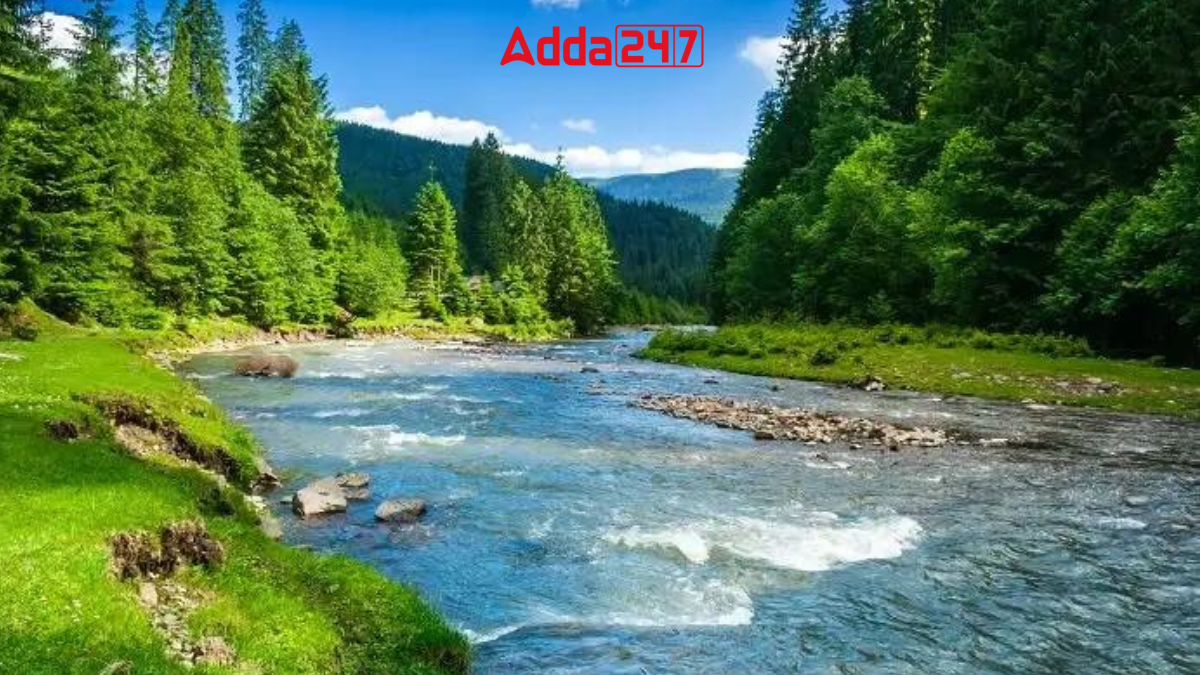India boasts a rich network of rivers, integral to its cultural, ecological, and economic landscape. The Ganges, revered as sacred, flows through the plains of North India, while the Brahmaputra cascades through the northeast, shaping diverse ecosystems. The majestic Yamuna traverses the Gangetic plains, while the Godavari, Krishna, and Cauvery nourish the southern Deccan. These rivers sustain agriculture, provide transport, and are imbued with spiritual significance, reflecting India’s deep-rooted connection to water.
GK Quiz on Rivers of India
Test your knowledge about the rivers of India with this engaging quiz! Rivers are not just bodies of water; they are lifelines, shaping the geography, culture, and economy of the regions they traverse. Let’s see how much you know about the rivers that flow through the diverse landscape of India.
Q1. Which river is known as the “Sorrow of Bihar”?
a) Brahmaputra
b) Yamuna
c) Kosi
d) Kaveri
S1 Ans. (c)
Sol. The Kosi River is known as the “Sorrow of Bihar” as the yearly floods influence around 21,000 sq kmof fertile farming grounds in this way disturbing the rural economy. Floods claim numerous thousand of life of Human and Cattle.
Q2. Which river originates from the Gangotri Glacier?
a) Godavari
b) Ganges
c) Narmada
d) Krishna
S2. Ans. (b)
Sol. The river Ganga originates from the Gangotri Glacier, flows through the North Gangetic Plains, joins Brahmaputra and ends its journey in the Bay of Bengal.
Q3. Which river is also known as the “Dakshin Ganga”?
a) Ganges
b) Yamuna
c) Godavari
d) Brahmaputra
S3. Ans. (c)
Sol. River Godavari is also known as Dakshin Ganga. It is the largest Peninsular river system. It rises in the Nasik district of Maharashtra and discharges its water into the Bay of Bengal. Its tributaries run through the states of Maharashtra, Madhya Pradesh, Chhattisgarh, Odisha and Andhra Pradesh.
Q4. The river which forms the famous Jog Falls is:
a) Krishna
b) Tungabhadra
c) Cauvery
d) Sharavati
S4. Ans. (d)
Sol. Jog Falls is created by the Sharavati river dropping 253 m (830 ft), making it the third-highest waterfall in India after the Nohkalikai Falls with a drop of 335 m (1,099 ft) in Meghalaya and the Dudhsagar Falls with a drop of 310 m (1,020 ft) in Goa.
Q5. Which river is known as the lifeline of Gujarat?
a) Narmada
b) Tapti
c) Mahanadi
d) Sabarmati
S5. Ans. (a)
Sol. The largest river in Gujarat, originating in Amarkantak, Madhya Pradesh, the Narmada River spans a total length of 1,310 kilometers. In ancient times, it was known as the Rewa River and holds immense significance as the lifeline of both Gujarat and Madhya Pradesh.
Q6. The Chambal River is a tributary of which river?
a) Ganges
b) Godavari
c) Yamuna
d) Brahmaputra
S6. Ans. (a)
Sol. The Chambal River is a tributary of the Yamuna River in Central and Northern India, and thus forms part of the drainage system of the Ganges.
Q7. Which river is also known as the “Vridha Ganga”?
a) Godavari
b) Narmada
c) Krishna
d) Tapti
S7. Ans. (a)
Sol. Godavari, India’s second longest river after the river Ganga and is one among the peninsular rivers. The river Godavari is often referred to as Vridha Ganga because of its large size and extent among the peninsular rivers.
Q8. The river that forms the boundary between the states of Uttar Pradesh and Bihar is:
a) Yamuna
b) Ganges
c) Brahmaputra
d) Gandak
S8. Ans. (d)
Sol. Gandak originates from the north of Dhaulagiri in Tibet near Nepal and enters into the Indian Territory near Triveni town in Nepal. It flows in a southern direction and forms a boundary between Uttar Pradesh and Bihar. Triveni Canal gets water from the Gandak River.
Q9. The river which is called the “Tsangpo” in Tibet is known as:
a) Ganges
b) Brahmaputra
c) Yamuna
d) Godavari
S9. Ans. (b)
Sol. The Brahmaputra River is a Himalayan river which originates in Tibet. It is also known as the TsangPo river in Tibet. It has one of the largest river basins of South Asia.
Q10. Which river is the longest river in India?
a) Ganges
b) Godavari
c) Brahmaputra
d) Yamuna
S10. Ans. (a)
Sol. Ganga is known as the longest river in India. It originates from the western side of India, which is also known as the Gangotri glaciers. The overall length of the Ganga river is considered to be 2525 kilometres.




 Which District is known as the Medical C...
Which District is known as the Medical C...
 Which was the First Women's University i...
Which was the First Women's University i...
 Which Island is known as the Island of P...
Which Island is known as the Island of P...








